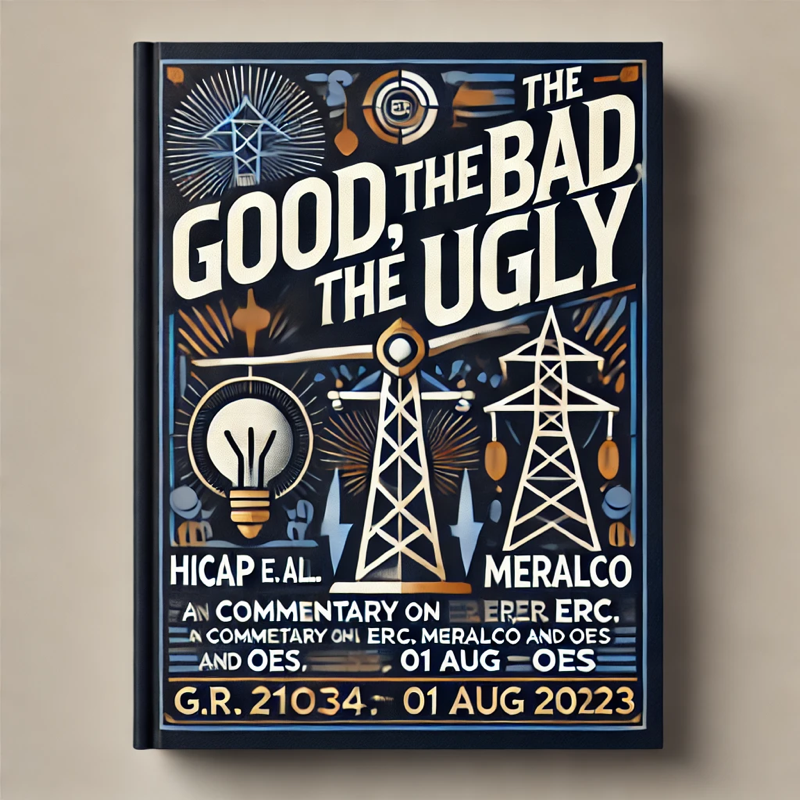Business
The Good, the Bad, the Ugly: A Commentary on Hicap et al. vs. ERC, MERALCO and OES (G.R. No. 210334, 01 Aug 2023)

The Good, the Bad, the Ugly: A Commentary on Hicap et al. vs. ERC, MERALCO and OES (G.R. No. 210334, 01 Aug 2023)
The Supreme Court’s ruling in Hicap et al. vs. ERC, MERALCO, and OES has sparked significant attention across the energy sector. The Energy Regulatory Commission (ERC) has welcomed the decision, affirming its legal standing and the validity of its regulatory actions. While we, as consumer advocates, fully respect the Court’s decision, we believe it is essential to examine its broader implications for electricity consumer advocacy. In light of this, our commentary is organized into three distinct categories: Good, Bad, and Ugly.
https://sc.judiciary.gov.ph/wp-content/uploads/2025/01/EN-BANC-G.R.NO_.210334_RESOLUTION-DATED-AUGUST-12023-2.pdf
The Good
At the outset, the ruling recognizes several positive and foundational principles that align with the public interest, particularly within the framework of the Electric Power Industry Reform Act (EPIRA) of 2001. These principles not only reinforce the ERC's regulatory authority but also clarify important aspects in the discharge of its functions:
- Upholding the ERC’s Authority under EPIRA: The Supreme Court reiterated that the ERC acted within its statutory powers as defined in the EPIRA and its Implementing Rules and Regulations (IRR). The decision affirms that the Commission’s scope of authority to oversee and regulate the electricity sector is sound and consistent with legislative intent. This is a crucial point, ensuring that regulatory bodies like the ERC are empowered to perform their functions without overreach or encroachment on their mandates.
- Confirmation and Post-Verification: The Court validated the importance of confirmation and post-verification processes in regulatory procedures. These processes are integral to ensuring that the rules and regulations are followed to the letter, preventing potential violations from going unnoticed. This promotes transparency and accountability, both of which are necessary for fostering consumer trust in the regulatory system.
- Validation of General Regulatory Power: Section 43(f) of the EPIRA grants the ERC significant regulatory power over the energy sector, including the authority to adopt rules and regulations to implement the law’s provisions. The Court’s endorsement of this power confirms that the ERC has the necessary tools at its disposal to oversee the functioning of the energy market, ensuring that it operates efficiently and in the best interests of consumers. This validation is crucial, as it strengthens the Commission's position in safeguarding public welfare.
The ruling, therefore, provides a solid foundation for regulatory certainty and stability in the electricity sector, which can be beneficial in the long run for both consumers and stakeholders.
The Bad
However, the decision is not without its troubling aspects. One particularly disconcerting element is the Court’s reaffirmation of a well-established rule that tends to favor the expertise of administrative agencies, including the ERC. While the principle of administrative expertise is foundational to the functioning of regulatory agencies, its application here sets a high bar for public interest litigation, especially for consumer advocates seeking to challenge regulatory decisions.
- High Bar for Legal Challenges: The decision reinforces the principle that courts should defer to the expertise of regulatory agencies in matters that fall within their purview. While this may seem reasonable, it creates significant hurdles for public interest litigants—particularly consumers who are trying to challenge the acts of regulatory agencies like the ERC. The Court's stance raises the evidentiary and procedural threshold for challenging regulatory actions, which could deter or even prevent meaningful litigation on behalf of consumers.
- "What Is" vs. "What Should Be" in Regulation: In consumer advocacy, the challenge lies not just in pointing out the present situation (“what is”) but also in advocating for what should be (“what should be”). Regulatory agencies, by their very nature, tend to operate within a framework that is often deeply technical and complex. However, this complexity is not always accessible or understandable to the general public or even to consumer advocates. The Supreme Court's decision, in this case, further elevates the complexity of challenging such decisions, leaving advocates with an even steeper uphill battle in their pursuit of reform.
Thus, while the Court’s deference to administrative expertise may provide legal certainty for the ERC, it also creates an uneven playing field where consumers, despite being directly affected by regulatory decisions, may struggle to have their voices heard.
The Ugly
However, the most troubling aspect of this decision lies in the inherent challenges of consumer advocacy litigation within the energy sector. The regulatory landscape, which spans four distinct but interconnected sectors—generation, transmission, distribution, and the contestable market—requires a level of technical expertise that is often far beyond the reach of ordinary consumers.
- Disparity of Resources: In contrast to consumers, the regulated entities (such as MERALCO) have vast resources at their disposal. These companies employ teams of skilled lawyers, regulatory experts, and in-house legal counsel whose primary job is to ensure that their interests are well-protected. Consumers, on the other hand, are often left with limited access to the same level of legal expertise and regulatory insights. This imbalance creates a stark power differential in the regulatory and legal processes, making it harder for consumer advocates to mount effective challenges.
- Lack of Access to Information: Regulatory decisions are often based on highly technical documents, filings, and data that are inaccessible or difficult for consumers to understand. As a result, even well-intentioned consumer advocacy groups may find it difficult to make informed challenges to regulatory decisions. This lack of transparency exacerbates the problem, as consumers are often unaware of how decisions that affect their electricity bills are made. We see this in the energy industry beat of Alvin Elchico in TV Patrol- every time there is an issue with MERALCO, consumers don't even try to comprehend; what they only concern themselves with is to pay the outstanding electricity bill.
- The Need for Consumer Education: One of the key areas in need of improvement is consumer education. While the Department of Energy (DOE) and the ERC have made some efforts in this regard, such as the proposal to establish the “ERC Academy,” there has been little follow-up. The idea behind the ERC Academy was to educate consumers and advocates about regulatory processes, making it easier for them to navigate the complex legal and technical landscape. Unfortunately, this initiative appears to have stalled, and the need for comprehensive consumer education remains urgent. Advocacy groups, despite their best efforts, are often hamstrung by a lack of resources, technical knowledge, and access to critical data.
To address this gap, both the DOE and ERC must intensify their efforts to not only educate consumers but also to actively support consumer advocates by providing better access to relevant information, resources, and training. Without this kind of support, the playing field will remain tilted in favor of the big players in the energy sector, leaving consumers struggling to assert their rights.
In sum, while the Supreme Court’s decision in Hicap et al. vs. ERC, MERALCO, and OES provides clarity and reaffirms the regulatory authority of the ERC, it also exposes significant challenges for consumer advocates and public interest litigants. The deference to administrative expertise creates barriers to meaningful legal challenges, while the disparity in resources between consumers and regulated entities only deepens the power imbalance in regulatory proceedings. The landscape of electricity regulation is highly complex, and without better consumer education and greater transparency, the voices of everyday consumers are at risk of being drowned out in the noise of corporate interests. This decision, while legal in its reasoning, underscores the urgent need for reforms that empower consumers and level the playing field in the energy sector.
About the Author

Lester Nazarene V. Ople 2001
Lester Nazarene V. Ople 2001 is a practicing lawyer and a faculty member of Arellano University School of Law and University of Asia & the Pacific Institute of Law. His legal work includes consumer rights advocacy before the Energy Regulatory Commission, where he once headed the Human Resources Division.


